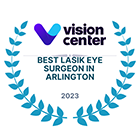
If you haven’t seen the headlines already, let us tell you the good news: there is a new FDA-approved eye drop that replaces the need for reading glasses. Optometrists and ophthalmologists across the country have seen an astounding interest in these eye drops from their patients. Our hope for this blog post is to answer some of your top questions such as how the eye drops work, what conditions they can help treat, and who is eligible for a prescription.
How the Vuity Presbyopia Eye Drops Work
This new treatment is designed for those affected by age-related Blurry Near Vision, also known as presbyopia. This is a condition that affects anywhere from one third to 40% of US adults. As we age, the lenses of our eyes become harder and they somewhat lose the ability to let in the proper amount of light for close distance sight.
While the effect is new, the treatment offered in these eye drops is not. The new eye drops from Vuity use an active ingredient known as pilocarpine. It stimulates different muscles of the eye and reduces the size of the pupil. So, it improves vision through a ‘pinhole effect’ that lasts somewhere between 3-6 hours depending on the eye. At a higher dose, pilocarpine can be used by glaucoma patients as a way to lower eye pressure.
How to Get Vuity Eye Drops
The Vuity presbyopia eye drops come in a one month supply, which will cost about $80 due to them not being covered by health insurance, and are available to those with a prescription. If you currently use reading glasses to read things up close to you (or you should, but you haven’t bothered with glasses), then make an appointment with your eye care professional. They’ll be able to examine your vision and listen to your vision needs to determine if Vuity eye drops would be a good fit for you.
Who is Eligible for a Vuity Eye Drop Prescription
Vuity has said their new eye drops work best for adults in their 40s or early 50s with mild to moderate cases. While nearly 40% of US adults are living with presbyopia, it’s sometimes hard to notice if the changes happened subtly. Some signs you may be experiencing presbyopia are needing a brighter light to read, and holding items or squinting in order to read clearly. Even beyond reading a book or your phone, presbyopia can also affect your ability to read your car's dashboard, viewing the food on your plate, or putting on makeup.
What If I Can’t Get a Prescription?
If you find that you don’t fall into the categories we’ve described above, then it may be a good idea to explore alternative vision correction treatments. You may be a good candidate for laser vision correction such as LASIK or Refractive Lens Surgery. To explore your options, contact the doctors at Silk Vision & Surgical Center for an appointment.











.png)

